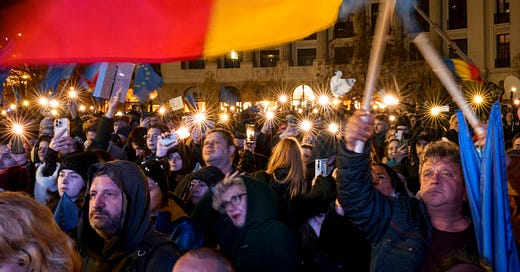Russia has had a busy few months with its relentless attacks on elections across Europe and the United States. Since late October, Moscow’s hybrid warfare tactics have targeted Georgia, Moldova, the United States, and Romania. From orchestrating bomb threats during the U.S. presidential race to meddling in Romania’s annulled election, the Kremlin has deployed its playbook with calculated precision. These efforts are part of a broader strategy to subvert democracies, sow societal divisions, and expand its influence.
Russia’s Busy Few Months: A Relentless Assault on Elections
In Romania, the annulment of the first round of presidential elections laid bare Kremlin interference. Russian networks on TikTok and Telegram boosted far-right candidate Calin Georgescu, flooding social media with anti-NATO propaganda and pro-Moscow narratives. The scale and sophistication of these operations were alarming, yet again, showcasing Moscow’s ability to manipulate public opinion. Romania’s bold decision to annul the election and declassify intelligence about the interference sent a clear message: they will not tolerate Russian interference.
In Georgia, Moscow continued its support for the ruling pro-Kremlin Georgian Dream party, which rigged elections and actively suppressed opposition voices. Protests have erupted against the Georgian Dream party, reflecting growing public anger over its ties to the Kremlin and its shift away from Georgia's pro-EU aspirations. Russian-backed media and disinformation operations have relentlessly targeted pro-democracy and pro-EU movements, attacking opposition leaders and amplifying pro-Kremlin propaganda in Moscow's efforts to retain its influence in Georgia.
Similarly, Russia’s hybrid warfare tactics in Moldova were evident in the run-up to the country’s October 2024 elections. Despite Moscow’s best efforts and multi-faceted operations to sway the outcome, they ultimately failed to manipulate the results. However, the Kremlin’s interference underscored its ongoing attempt to disrupt pro-EU governments and destabilize the region. Moldova's response highlighted the resilience of its people, but the persistent threat of Russian influence continues to loom over the country’s future.
Meanwhile, in the United States, Russia's disinformation operations during the 2024 presidential election were nothing short of aggressive. Kremlin-backed operatives flooded social media platforms like X and TikTok with fabricated content, including fake AI-generated videos and false claims of election fraud targeting Democratic candidates. Moscow also leveraged social media influencers to spread pro-Russian propaganda and amplify divisive messages. On Election Day, bomb threats, traced back to Russia, were called into polling stations in key battleground states, causing evacuations and voting disruptions. These coordinated efforts aimed to disrupt the election process, sow division, and undermine public trust in the integrity of the vote—hallmarks of Russia's hybrid warfare strategy.
Coordinated Inauthentic Behavior
Moscow’s use of coordinated inauthentic behavior (CIB) has become increasingly sophisticated. In Romania, a network of 22 TikTok accounts with a combined 300,000 followers pushed anti-government content. In Georgia, trolls targeted opposition leaders with smear campaigns. In the U.S., fake profiles spread Kremlin disinformation about election integrity.
Russia's Bold Information Warfare: No Longer Hiding Its Footprints
Russia’s bold information warfare tactics have become increasingly brazen, with the Kremlin no longer hiding its fingerprints on global destabilization efforts. From Moldova to the United States, Moscow’s disinformation campaigns are no longer subtle; they are aggressive, direct, and highly organized.
As Russia intensifies its assaults on elections and destabilizes democracies, NATO must adapt its strategy to effectively counter these growing threats. Tech companies, too, must be held accountable for enabling the spread of disinformation. The 2024 elections underscore the Kremlin’s persistent danger, but Romania’s swift and decisive response to Russian interference offers a clear example of how to tackle these threats. Other nations should take note!
For more info on Russia's disinformation operations in the U.S.
From Kremlin to MAGA: Russia's Decade-Long Influence in America
For decades, Russia has been running a sophisticated operation designed to destabilize the United States and polarize its society. With Trump’s return to power in the aftermath of the 2024 election, it is clearer than ever that Moscow’s long game—leveraging disinformation, propaganda, and psychologi…






